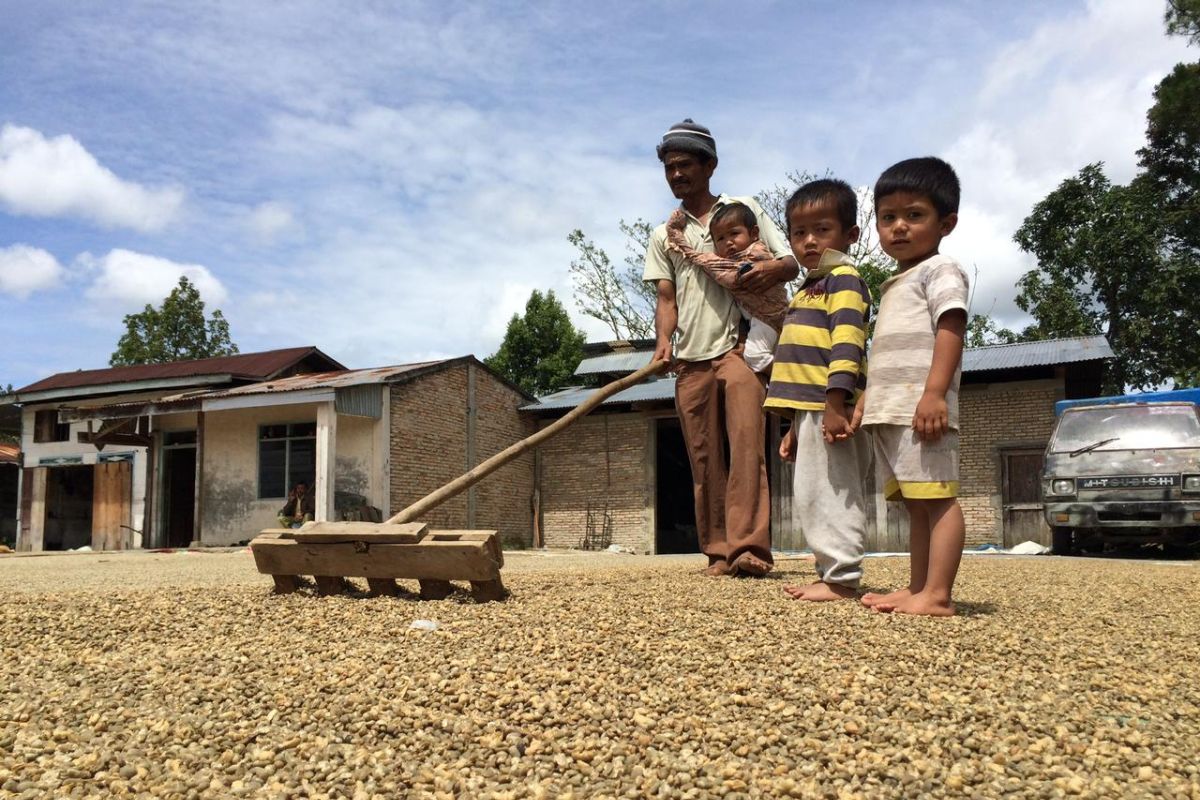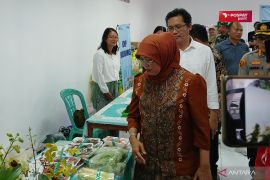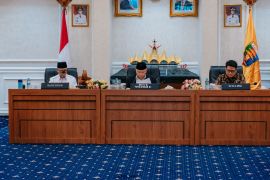These words were stated by Fikar W. Eda, also a well-known poetry reader.
The coffee drinking habit is not just to pass leisure time, but it can also be your friend at work or be a conversation-starter between two people.
This is what commonly occurs when a person sips a cup of Arabica, Robusta, and Liberika coffee, especially at hotels, restaurants, cafes, and also roadside coffee shops.
However, the coffee drinking habit was disrupted in the past year owing to the application of health protocols to stem the transmission of the coronavirus disease 2019 (COVID-19) outbreak. A decline was also recorded in the sales of coffee.
"Before the pandemic, the monthly coffee sales usually reached two tons. However, since the COVID-19 pandemic broke out in March 2020, sales have dropped by almost 80 percent," Fachriz Tanjung, coffee bean retailer from Sumatra, stated.
In fact, different government policies applied across regions and provinces, such as large-scale social restrictions and capping operating hours at night to impose curfews, also significantly impacted coffee sales.
Consequently, some coffee shops and cafes chose to temporarily close their businesses when the policy was enforced. In fact, some of them were compelled to close and not open at all.
Sales of coffee beans in the domestic market came under increasing pressure, although some other cafes and coffee shops continue to serve coffee connoisseurs with a "take away" system in the new normal era.
"Finally, we, as a coffee bean supplier, adopt a 'win-win solution' scheme. If all this time, the retail business network, with the buy-out model has been cut, we will now put a pause to payment according to the agreed time," Tanjung stated.
The move to pause the payment for the purchase of coffee was able to marginally generate sales of Gayo coffee beans in Aceh, Karo, Lintong, Mandailing, and Sipirok in North Sumatra, Liberika Meranti in Riau, Kerinci in Jambi, South Sumatra, and Lampung.
The sales of coffee beans have slowly begun increasing since the time when a 20- to 40-percent monthly drop was recorded in the domestic market, and most of the marketing to Java Island was the mainstay of the Arabica Gayo coffee beans.
"In addition, we continue to innovate. Akin to the start of 2021, we opened a coffee shop. In addition to educational places for residents attending in person, they can also choose coffee in the form of roasted beans or powder at affordable prices,” Fachriz remarked.
The coffee bean retailer in Medan City also admitted that alongside continuing to market Sumatran coffee in the domestic market, he had expanded his network to neighboring nations.
The business he has been running since 2011 began to bear fruit through the application of intense marketing.
Prospective buyers of coffee beans from Malaysia also paid him a direct visit to ensure the availability of coffee raw materials, to observe locations for drying and also sent samples as well as forged cooperation or business agreements.
"At the end of 2019, a buyer from Malaysia had approached me for 600 kilograms of civet coffee per month," he recalled.
However, on entering the final stage, a pandemic broke out. Countries in Asia, including Malaysia and Indonesia, shut down all business activities, which ultimately resulted in the cancellation of the promised civet coffee transaction.
According to the North Sumatra Statistics Agency’s data from January to November 2020, the volume of coffee exports from North Sumatra had plunged by 12 percent as compared to the corresponding period in the previous year.
"During the January-November 2020 period, the total volume of coffee exports from North Sumatra had reached 53,585 tons. Meanwhile, for the January-November 2019 period, the volume of coffee exports had reached 61,176 tons, or a decrease of 7,591 tons," Head of the North Sumatra Statistics Agency, Syech Suhaimi, stated.
A steeper drop was apparent from the value of North Sumatra’s coffee exports, which decreased 23 percent during the January-November 2020 period, as compared to the corresponding period in the previous year.
The foreign exchange value of North Sumatra’s coffee exports during the January-November 2020 period was recorded at US$259,114 million, while the figure reached US$337,293 million during the January-November 2019 period.
"A decline occurred in value of US$78.179 million until November 2020," Suhaimi stated.
Chairman of the Indonesian Coffee Exporters Association (AEKI) for North Sumatra, Saidul Alam, remarked that both the volume and value of coffee exports had declined owing to the impact of the COVID-19 pandemic.
Alam remarked that the pandemic had struck last year on a global scale, including the biggest coffee importing countries from North Sumatra, such as the United States, Japan, and the People's Republic of China.
Despite Arabica still constituting most of North Sumatra's coffee exports conducted through the Port of Belawan all through 2020, according to the Certificate of Origin, the figure reached 49,031 tons valued at US$237,054 million.
Arabica exports in 2020 fell as compared to 2019 during which the figure had reached 58,674 tons, or worth US$327,580 million. Arabica varieties always dominated North Sumatra’s coffee exports in line with the lack of Robusta production.
Alam was unable to forecast North Sumatra’s coffee exports in 2021 as the world of trade has been reeling from the impacts of the COVID-19 pandemic.
However, the AEKI chairman expects an improvement in the volume and value of coffee exports again in 2021, although slight doubts still lingered on in the wake of the ongoing COVID-19 pandemic.
Government target
In fact, the North Sumatra provincial government had recently targeted to become the largest producer of coffee beans in Indonesia on account of the region’s potential.
"North Sumatra aspires to become the fourth-largest producer in all of Indonesia. It is expected to emerge as the second-largest or even the biggest. Moreover, North Sumatra has eight coffee-producing regions,” Deputy Governor of North Sumatra, Musa Rajekshah, stated.
The eight districts and cities in North Sumatra are South Tapanuli (Tapsel), Mandailingnatal (Madina), Simalungun, Dairi, Karo, Toba Samosir (Tobasa), North Tapanuli (Taput), and Humbanghasundutan (Humbahas).
According to the Central Statistics Agency (BPS) data, coffee production from North Sumatra in 2018 was recorded at 72,379 tons comprising 63,425 tons of Arabica and 8,954 tons of Robusta.
Arabica coffee plantations span an area of 71,955 hectares, while Robusta plantations spread across 19,416 hectares.
The government seeks to improve the quality of the locally produced coffee by disseminating information and offering superior-quality coffee seeds to farmers.
The coffee seeds provided are of Arabica coffee, with a higher selling value and quality production. Hence, selling price in the market is also good.
"North Sumatra currently produces more types of Arabica coffee after the farmers gradually switched from Robusta to Arabica," according to Rajekshah.
The coronavirus disease, which originated in Wuhan, China, in 2019, spread rapidly to various countries and battered the global economy and triggered a new crisis.
Hopes ride high on coffee retailers developing innovations, viewed as being one of the salvaging factors, amid the pressure from the national coffee processing business owing to declining domestic and foreign demand.
Continued innovation will help to ensure continuity of the coffee processing business to stay afloat amid the looming threat of bankruptcy.
Related news: For super-priority destination tag, Toba requires infrastructure push
Related news: Conserving North Maluku's maritime treasures
Editor: Gusti Nur Cahya Aryani
Copyright © ANTARA 2021












